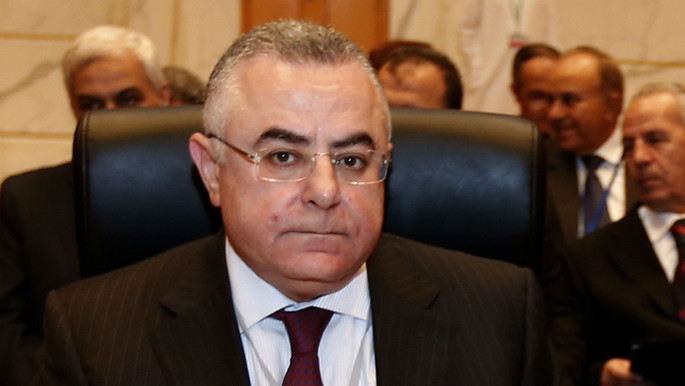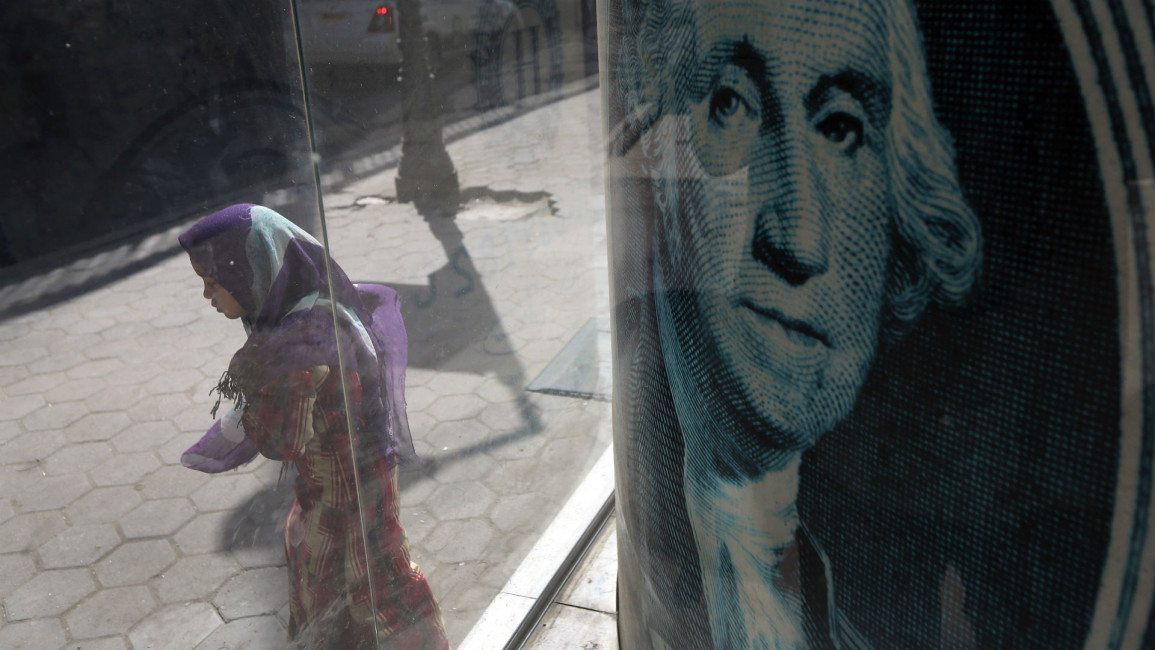Egypt's top banker resigns after currency row
Egypt's top banker resigns after currency row
Infighting between Egypt's central bank chief and members of cabinet led to his resignation this week, Egyptian officials have told al-Araby al-Jadeed.
4 min read
The Egyptian pound has come under sustained pressure [Getty]
Hisham Ramez's recent rows with ministers led to the appointment of senior banker Tarek Amer as the new head of Egypt's monetary authority, in a move that has pleased businessmen and bankers alike, banking officials said this week.
Ramez, whose term as head of Egypt's central bank ends on November 26, has faced increasing criticism for his reluctance to devalue the Egyptian pound, which has come under sustained pressure.
Instead, he has sought to tame a currency black market by imposing a cap on dollar-denominated bank deposits.
This and other measures have angered local businesses starved of foreign currency to pay for imports.
With the central bank selling dollars to defend the pound, Egypt's foreign exchange reserves have tumbled from $36 billion in 2011 to $16.3 billion in September, enough to cover just three months of imports.
"Over the past few months, infighting between Ramez and several ministers escalated over his management of monetary policies towards reducing debt and tackling inflation and high prices," an Egyptian official told al-Araby's Arabic service.
"His policies were constantly embarrassing the government in front of public opinion because they persistently raised prices and devalued the Egyptian pound against the US dollar," the official, who spoke under the condition of anonymity, added.
"The battle really erupted around a month ago when Minster of Investment Ashraf Salman, said at the Euromoney Conference that devaluing the pound would have to happen, given the economic conditions in Egypt," he said.
The source said that Ramez considered the comment "blatant interference", which would seriously damage the foreign exchange market and push USD holders to hold onto their currency.
Ramez recently came under fire after he blamed the "new" Suez Canal, which cost $8 billion, for the fall in foreign-exchange reserves.
A government official told al-Araby that Tarek Amer's appointment was a big win for tycoons - as he was expected to soon issue a decree that scrapped maximum cash deposits of USD.
Economist Atif Abd al-Latif said the Egyptian economy and tourism industry could see a major breakthrough and a solution to the foreign currency crisis with Amer.
Amer is veteran banker who came to prominence during the final years of the Mubarak regime and is an old colleague of the ousted president's son Gamal Mubarak - the pair worked together at Bank of America's branch in Egypt.
Bankers say Amer, who also previously worked at Citibank and was a deputy central bank governor, is a team player better suited to building strong ties with global institutions such as the International Monetary Fund.
Some say he is more liberal-minded than Ramez. At the very least, bankers expect a more collaborative relationship.
Under Ramez, the central bank had kept the pound steady at 7.5301 pounds to the dollar for the five months until July, then allowed it to slide to 7.6301 as pressure built. It later let it slip by a further 0.10 pounds on July 5.
Early this month, Ramez introduced another round of devaluation, weakening the pound to 7.8301 on October 15, and followed that by another 0.10 pound devaluation on October 18.
The dollar was trading at 8.62 pounds on the black market after the announcement, two traders said, unchanged from the day before.
Along with currency controls, Ramez also created a priority list that banks must abide by in distributing dollars. Strategic goods such as food and medicine are at the top of the list.
Egypt's economy grew about 4.2 percent last fiscal year and the government forecasts growth of five percent in 2015/16. It is struggling to return to the growth enjoyed before a 2011 uprising deterred foreign investors and discouraged tourists.
But critics said dollar restrictions had hampered business activity overall and could ultimately hurt growth.
Last week, the minister of social solidarity said Egypt would not be able distribute 55 billion Egyptian pounds ($6.8 billion) of pensions because of the current currency crisis.
Ramez, whose term as head of Egypt's central bank ends on November 26, has faced increasing criticism for his reluctance to devalue the Egyptian pound, which has come under sustained pressure.
 |
|
| Ramez has recently faced increasing criticism [Getty] |
This and other measures have angered local businesses starved of foreign currency to pay for imports.
With the central bank selling dollars to defend the pound, Egypt's foreign exchange reserves have tumbled from $36 billion in 2011 to $16.3 billion in September, enough to cover just three months of imports.
"Over the past few months, infighting between Ramez and several ministers escalated over his management of monetary policies towards reducing debt and tackling inflation and high prices," an Egyptian official told al-Araby's Arabic service.
"His policies were constantly embarrassing the government in front of public opinion because they persistently raised prices and devalued the Egyptian pound against the US dollar," the official, who spoke under the condition of anonymity, added.
"The battle really erupted around a month ago when Minster of Investment Ashraf Salman, said at the Euromoney Conference that devaluing the pound would have to happen, given the economic conditions in Egypt," he said.
The source said that Ramez considered the comment "blatant interference", which would seriously damage the foreign exchange market and push USD holders to hold onto their currency.
Ramez recently came under fire after he blamed the "new" Suez Canal, which cost $8 billion, for the fall in foreign-exchange reserves.
A government official told al-Araby that Tarek Amer's appointment was a big win for tycoons - as he was expected to soon issue a decree that scrapped maximum cash deposits of USD.
|
His policies were constantly embarrassing the government in front of public opinion - Egyptian offical |
Economist Atif Abd al-Latif said the Egyptian economy and tourism industry could see a major breakthrough and a solution to the foreign currency crisis with Amer.
Amer is veteran banker who came to prominence during the final years of the Mubarak regime and is an old colleague of the ousted president's son Gamal Mubarak - the pair worked together at Bank of America's branch in Egypt.
Bankers say Amer, who also previously worked at Citibank and was a deputy central bank governor, is a team player better suited to building strong ties with global institutions such as the International Monetary Fund.
Some say he is more liberal-minded than Ramez. At the very least, bankers expect a more collaborative relationship.
Under Ramez, the central bank had kept the pound steady at 7.5301 pounds to the dollar for the five months until July, then allowed it to slide to 7.6301 as pressure built. It later let it slip by a further 0.10 pounds on July 5.
Early this month, Ramez introduced another round of devaluation, weakening the pound to 7.8301 on October 15, and followed that by another 0.10 pound devaluation on October 18.
The dollar was trading at 8.62 pounds on the black market after the announcement, two traders said, unchanged from the day before.
Along with currency controls, Ramez also created a priority list that banks must abide by in distributing dollars. Strategic goods such as food and medicine are at the top of the list.
Egypt's economy grew about 4.2 percent last fiscal year and the government forecasts growth of five percent in 2015/16. It is struggling to return to the growth enjoyed before a 2011 uprising deterred foreign investors and discouraged tourists.
But critics said dollar restrictions had hampered business activity overall and could ultimately hurt growth.
Last week, the minister of social solidarity said Egypt would not be able distribute 55 billion Egyptian pounds ($6.8 billion) of pensions because of the current currency crisis.



